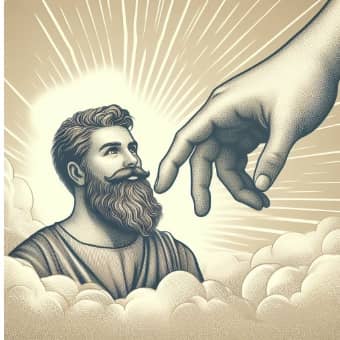Understanding the Creation of Man in God’s Image
The Divine Blueprint
Throughout history, one of the most profound theological and philosophical concepts has been the notion that humans were created in the image of God. This idea, rooted deeply in Judeo-Christian traditions, provides a rich tapestry of meaning for believers and scholars alike.
In this blog post, we will explore the intricacies of what it means to be created in God’s image, delving into biblical texts, theological interpretations, and the lasting implications for humanity.
This blog post contains affiliate links. When you click on a link on this page and make a purchase I may earn a small commission, at no additional cost to you. Thank you for your support.
The Biblical Foundation
The concept of humans being created in God’s image originates from the Book of Genesis. Genesis 1:26-27 states:
“Then God said, ‘Let us make mankind in our image, in our likeness, so that they may rule over the fish in the sea and the birds in the sky, over the livestock and all the wild animals, and over all the creatures that move along the ground.’ So God created mankind in his own image, in the image of God he created them; male and female he created them.”
These verses highlight a couple of key points:
Divine Intention: The use of the plural “us” and “our” has been a point of theological discussion, often interpreted as a reference to the Trinity.
Humanity’s Role: Humans are appointed as stewards of creation, reflecting God’s sovereign authority over the earth.
Equality and Unity: Both male and female are created in the image of God, emphasizing equality and mutual reflection of the divine image.
Theological Interpretations
Imago Dei: The Image of God
The Latin term “Imago Dei” is used to describe the theological concept of humans being made in God’s image. This has been interpreted in several ways:
Substantive View: This perspective focuses on the attributes shared between God and humans, such as rationality, morality, and the ability to form relationships.
Relational View: This interpretation emphasizes the relational nature of the divine image, where the ability to have relationships mirrors the relational nature of the Trinity.
Functional View: This view sees the image of God in humanity’s role and function, particularly the responsibility to steward creation.
The Fall and Restoration
The concept of being created in God’s image also interacts with the narrative of the Fall. When Adam and Eve sinned, the image of God in humanity was marred, but not destroyed. Christian theology generally holds that redemption through Christ aims to restore this image.
Ephesians 4:24 speaks of putting on the “new self, created to be like God in true righteousness and holiness.”

Implications for Humanity
Dignity and Worth
Understanding that every human is made in the image of God bestows inherent dignity and worth on all individuals. This belief underpins ethical behavior and policies regarding human rights, equality, and justice. It calls for a humane and compassionate approach in dealing with others, irrespective of their background or status.
Responsibility and Stewardship
As bearers of God’s image, humans are entrusted with the care of the environment and all creation. This stewardship entails not just dominion, but also a responsibility to nurture, protect, and sustain the world around us.
Community and Relationship
The relational aspect of being made in God’s image underscores the importance of community and relationships. It encourages living in harmony, fostering strong familial and social bonds, and working towards the common good.
Conclusion
The creation of man in God’s image is a profound and multi-faceted doctrine that influences how we view ourselves, others, and our responsibilities on this planet. It serves as a cornerstone for our understanding of human dignity, ethical behavior, and the importance of relationships and stewardship.
By reflecting on this divine blueprint, we can strive to live in a way that honors our Creator and the intrinsic value bestowed upon us.
Looking for unique Catholic gifts? Check out our gift guide!

